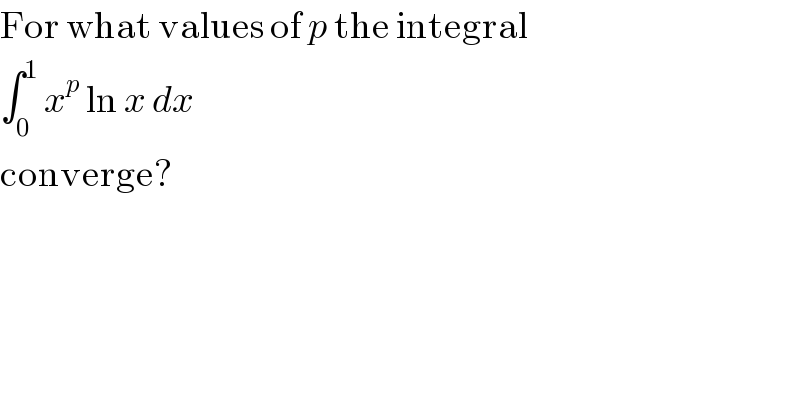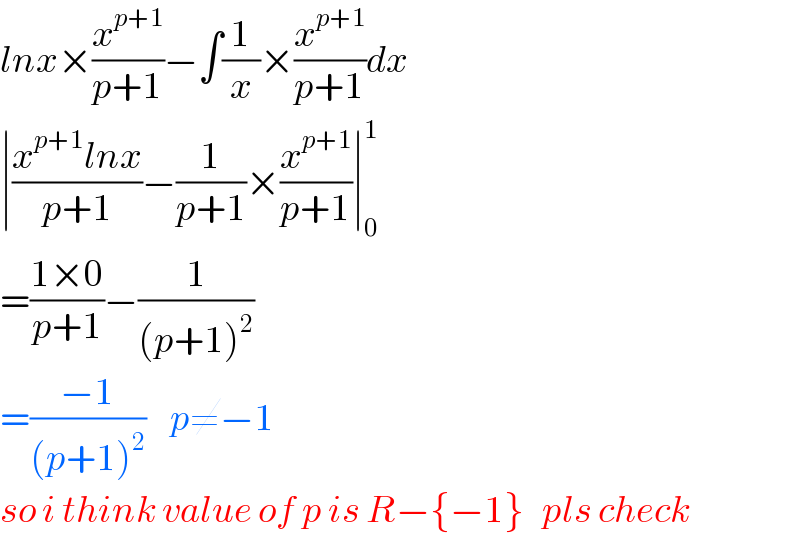Question Number 55856 by Joel578 last updated on 05/Mar/19

$$\mathrm{For}\:\mathrm{what}\:\mathrm{values}\:\mathrm{of}\:{p}\:\mathrm{the}\:\mathrm{integral} \\ $$$$\int_{\mathrm{0}} ^{\mathrm{1}} \:{x}^{{p}} \:\mathrm{ln}\:{x}\:{dx} \\ $$$$\mathrm{converge}? \\ $$
Commented by maxmathsup by imad last updated on 05/Mar/19

$${let}\:\:{A}_{{p}} =\int_{\mathrm{0}} ^{\mathrm{1}} \:\:{x}^{{p}} {ln}\left({x}\right){dx}\:\:{changement}\:{ln}\left({x}\right)=−{t}\:{give}\:\:{x}\:={e}^{−{t}} \\ $$$${A}_{{p}} =−\int_{\mathrm{0}} ^{\infty} \left({e}^{−{t}} \right)^{{p}} \:\left({t}\right)\:{e}^{−{t}} \:{dt}\:=−\int_{\mathrm{0}} ^{\infty} \:\:{t}\:{e}^{−\left({p}+\mathrm{1}\right){t}} {dt} \\ $$$${if}\:{p}>−\mathrm{1}\:\:\:{A}_{{p}} \:{converges}\:\:\:\:{if}\:{p}\leqslant−\mathrm{1}\:\:\:{lim}_{{t}\rightarrow+\infty} {t}\:{e}^{−\left({p}+\mathrm{1}\right){t}} \:=+\infty\:\Rightarrow{A}_{{p}} {diverges} \\ $$
Answered by tanmay.chaudhury50@gmail.com last updated on 05/Mar/19

$${lnx}×\frac{{x}^{{p}+\mathrm{1}} }{{p}+\mathrm{1}}−\int\frac{\mathrm{1}}{{x}}×\frac{{x}^{{p}+\mathrm{1}} }{{p}+\mathrm{1}}{dx} \\ $$$$\mid\frac{{x}^{{p}+\mathrm{1}} {lnx}}{{p}+\mathrm{1}}−\frac{\mathrm{1}}{{p}+\mathrm{1}}×\frac{{x}^{{p}+\mathrm{1}} }{{p}+\mathrm{1}}\mid_{\mathrm{0}} ^{\mathrm{1}} \\ $$$$=\frac{\mathrm{1}×\mathrm{0}}{{p}+\mathrm{1}}−\frac{\mathrm{1}}{\left({p}+\mathrm{1}\right)^{\mathrm{2}} } \\ $$$$=\frac{−\mathrm{1}}{\left({p}+\mathrm{1}\right)^{\mathrm{2}} }\:\:\:\:{p}\neq−\mathrm{1} \\ $$$${so}\:{i}\:{think}\:{value}\:{of}\:{p}\:{is}\:{R}−\left\{−\mathrm{1}\right\}\:\:\:{pls}\:{check} \\ $$
Commented by tanmay.chaudhury50@gmail.com last updated on 05/Mar/19

$${thank}\:{you}\:{sir}…{is}\:{my}\:{answer}\:{correct}… \\ $$
Commented by Joel578 last updated on 05/Mar/19
![Sir I think p should be ≤ −1 I =lim_(t→0^+ ) [((x^(p+1) (ln x))/(p + 1)) − (x^(p+1) /((p + 1)^2 ))]_t ^1 ⇒ lim_(t→0^+ ) {(0 − (1/((p + 1)^2 ))) − (((t^(p+1) (ln t))/(p + 1)) − (t^(p+1) /((p + 1)^2 )))} ⇒ − (1/((p + 1)^2 )) − lim_(t→0^+ ) {(t^(p+1) /(p + 1))(ln t − (1/(p + 1)))} when p + 1 = 0 ⇔ p = −1, I diverge when p + 1 < 0 ⇔ p < − 1, (p + 1) is negative, which mean t^(p+1) → ∞ as t → 0^+ . Hence I = −(1/((p + 1)^2 )) − ∞ = −∞ (diverge)](https://www.tinkutara.com/question/Q55878.png)
$$\mathrm{Sir}\:\mathrm{I}\:\mathrm{think}\:{p}\:\mathrm{should}\:\mathrm{be}\:\leqslant\:−\mathrm{1} \\ $$$${I}\:=\underset{{t}\rightarrow\mathrm{0}^{+} } {\mathrm{lim}}\:\left[\frac{{x}^{{p}+\mathrm{1}} \left(\mathrm{ln}\:{x}\right)}{{p}\:+\:\mathrm{1}}\:−\:\frac{{x}^{{p}+\mathrm{1}} }{\left({p}\:+\:\mathrm{1}\right)^{\mathrm{2}} }\right]_{{t}} ^{\mathrm{1}} \\ $$$$\Rightarrow\:\underset{{t}\rightarrow\mathrm{0}^{+} } {\mathrm{lim}}\:\left\{\left(\mathrm{0}\:−\:\frac{\mathrm{1}}{\left({p}\:+\:\mathrm{1}\right)^{\mathrm{2}} }\right)\:−\:\left(\frac{{t}^{{p}+\mathrm{1}} \left(\mathrm{ln}\:{t}\right)}{{p}\:+\:\mathrm{1}}\:−\:\frac{{t}^{{p}+\mathrm{1}} }{\left({p}\:+\:\mathrm{1}\right)^{\mathrm{2}} }\right)\right\} \\ $$$$\Rightarrow\:−\:\frac{\mathrm{1}}{\left({p}\:+\:\mathrm{1}\right)^{\mathrm{2}} }\:−\:\underset{{t}\rightarrow\mathrm{0}^{+} } {\mathrm{lim}}\:\left\{\frac{{t}^{{p}+\mathrm{1}} }{{p}\:+\:\mathrm{1}}\left(\mathrm{ln}\:{t}\:−\:\frac{\mathrm{1}}{{p}\:+\:\mathrm{1}}\right)\right\} \\ $$$$\mathrm{when}\:{p}\:+\:\mathrm{1}\:=\:\mathrm{0}\:\Leftrightarrow\:{p}\:=\:−\mathrm{1},\:{I}\:\mathrm{diverge} \\ $$$$\mathrm{when}\:{p}\:+\:\mathrm{1}\:<\:\mathrm{0}\:\Leftrightarrow\:{p}\:<\:−\:\mathrm{1},\:\left({p}\:+\:\mathrm{1}\right)\:\mathrm{is}\:\mathrm{negative}, \\ $$$$\mathrm{which}\:\mathrm{mean}\:\:\:{t}^{{p}+\mathrm{1}} \:\rightarrow\:\infty\:\:\mathrm{as}\:\:{t}\:\rightarrow\:\mathrm{0}^{+} .\: \\ $$$$\mathrm{Hence}\:{I}\:=\:−\frac{\mathrm{1}}{\left({p}\:+\:\mathrm{1}\right)^{\mathrm{2}} }\:−\:\infty\:=\:−\infty\:\left(\mathrm{diverge}\right) \\ $$
Commented by Joel578 last updated on 05/Mar/19

$$\mathrm{please}\:\mathrm{correct}\:\mathrm{if}\:\mathrm{I}\:\mathrm{am}\:\mathrm{wrong} \\ $$
